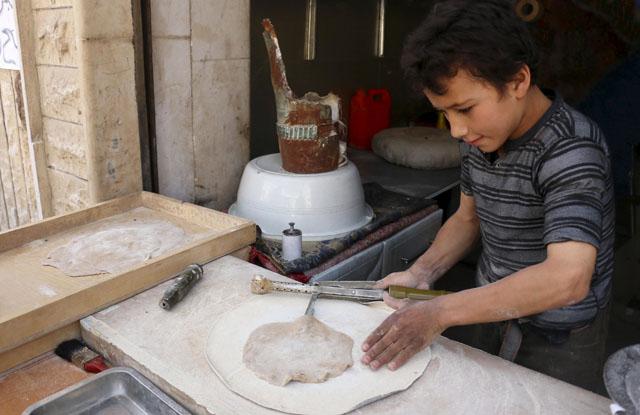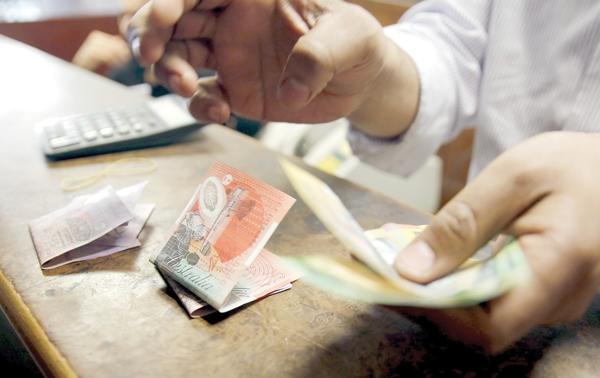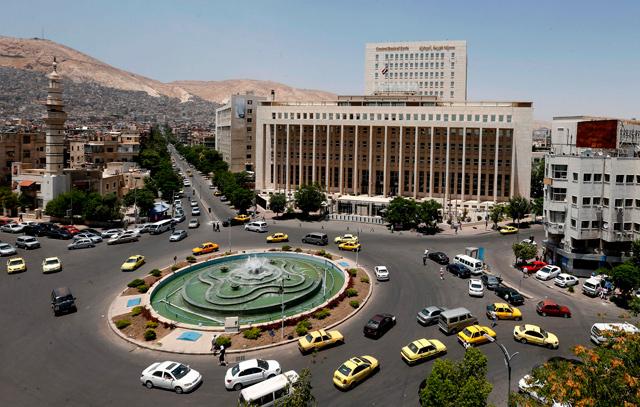You are here
Syrian pound hits record low
By Reuters - Apr 29,2015 - Last updated at Apr 29,2015

AMMAN — Concern over army setbacks against insurgents in recent weeks drove black market rates for the Syrian pound to a record low against the dollar on Wednesday, dealers and bankers said.
Three dealers speaking by phone from Damascus said it cost as much as 315 to 310 Syrian pounds to buy one dollar on the street. The currency hovered even higher in other parts of the country, trading at 324-328 pounds to the dollar, compared with 220 pounds to the dollar at the start of the year.
"People are trying to get as many dollars as they can get their hands on," said one exchange dealer.
From fresh produce vendors to manufacturers, from importers to taxi drivers, the crisis has brought the dollar into wider circulation as people try to protect themselves against currency depreciation and inflation.
The previous record low was in July 2013 when it hit 310 pounds over concerns about possible US military action. This compared to around 47 pounds at the start of the 2011 uprising against President Bashar Assad.
Insurgents have captured strategic territory in the south of the country and in the northwestern Idlib province, where they have edged closer to the government-held Latakia province, one of the most important areas for Assad and the Alawite community.
As anti-government fighters gain more ground, Syrians are less hopeful the economy will improve, dealers and two bankers said, adding people were increasingly hoarding dollars.
"People have been shocked by the recent rapid events on the battlefield and the psychological impact has made people turn to the dollar as a safe haven," indicated one Damascus-based banker who requested anonymity.
The fall has followed a period of relative stability after the United States and allied forces started air strikes in Syria against Daesh militants last year.
The currency was also buoyed by a government crackdown on speculators accused of profiteering by hoarding dollars and blamed for wild currency fluctuations.
Despite widespread devastation caused by the conflict and Western sanctions imposed on Syria, the currency has so far avoided a complete freefall, bankers say, citing large infusions of aid from the country's main regional ally Iran.
Iran is believed to have deposited hundreds of millions of dollars into the country's now depleted reserves that stood at $17 billion before the crisis.
The Syrian government has clamped down on currency exchanges in an effort to close the gap between the official and black market rate with some success. But the effect is wearing off now, according to a banker in a foreign-based bank that is based in Damascus.
Central Bank Governor Adeeb Mayaleh, who has long blamed the pound's fall in the black market on speculators, has recently vowed to take action to support the currency.
"The central bank hopes in the coming phase to support the stability of the exchange rate by taking a series of economic and monetary measures to support exports and production to reduce pressure on the pound in the short term," Mayaleh said.
"This will allow the central bank to intervene more effectively in the exchange market and satisfy the market needs," he added in recent statement to state news agency SANA.
But dealers and bankers contacted in Damascus and in Aleppo said central bank actions, including injecting $100 million into the market, had not been able to prevent the slide.
They also say commercial banks are not making available the quantities of dollars at the fixed price of 260 pounds to the dollar set by the central bank to calm markets.
The dollar's rise has boosted inflation which is at 120 per cent according to official data but probably is much higher, economists say.
Related Articles
CAIRO — Egypt's war on black market currency traders is not going to plan.
Egypt’s Central Bank has taken extraordinary steps to prop up the currency and curb a black market in foreign exchange — but in back alleys and money changing shops around the country, illicit dealing continues to thrive.
DAMASCUS — Syria's central bank devalued the Syrian pound on Wednesday giving in to weeks of depreciation on the black market as new US sanc


















